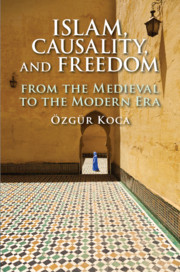Book contents
- Islam, Causality, and Freedom
- Islam, Causality, and Freedom
- Copyright page
- Dedication
- Contents
- Conventions
- Acknowledgments
- Introduction
- 1 Causality in the Early Period
- 2 Toward a Synthesis of Aristotelian and Neoplatonic Understandings of Causality
- 3 Occasionalism in the Middle Period
- 4 The First as Pure Act and Causality
- 5 Light, Existence, and Causality
- 6 The World as a Theophany and Causality
- 7 Continuities and Developments in Sufi Metaphysics
- 8 Toward an Occasionalist Philosophy of Science
- 9 Causality and Freedom in Later Islamic Philosophy
- 10 Occasionalism in the Modern Context
- 11 Islamic Theories of Causality in the Modern Context
- Conclusion
- Bibliography
- Index
2 - Toward a Synthesis of Aristotelian and Neoplatonic Understandings of Causality
The Case of Ibn Sīnā
Published online by Cambridge University Press: 14 May 2020
- Islam, Causality, and Freedom
- Islam, Causality, and Freedom
- Copyright page
- Dedication
- Contents
- Conventions
- Acknowledgments
- Introduction
- 1 Causality in the Early Period
- 2 Toward a Synthesis of Aristotelian and Neoplatonic Understandings of Causality
- 3 Occasionalism in the Middle Period
- 4 The First as Pure Act and Causality
- 5 Light, Existence, and Causality
- 6 The World as a Theophany and Causality
- 7 Continuities and Developments in Sufi Metaphysics
- 8 Toward an Occasionalist Philosophy of Science
- 9 Causality and Freedom in Later Islamic Philosophy
- 10 Occasionalism in the Modern Context
- 11 Islamic Theories of Causality in the Modern Context
- Conclusion
- Bibliography
- Index
Summary
The second chapter examines Ibn Sīnā’s account of causality and freedom through an analysis of his concepts of existence (wujūd) and essence (māhiyya). It will be argued that these concepts allow Ibn Sīnā to make a distinction between metaphysical and physical causality and, then, to locate physical causality within the larger context of metaphysical causality. As such, he offers an integration of Aristotelian and Neo-Platonic theories of causality. The result is a participatory theory of causality with strong Aristotelian elements that affirms freedom both in the created order and in the First.
- Type
- Chapter
- Information
- Islam, Causality, and FreedomFrom the Medieval to the Modern Era, pp. 40 - 59Publisher: Cambridge University PressPrint publication year: 2020

